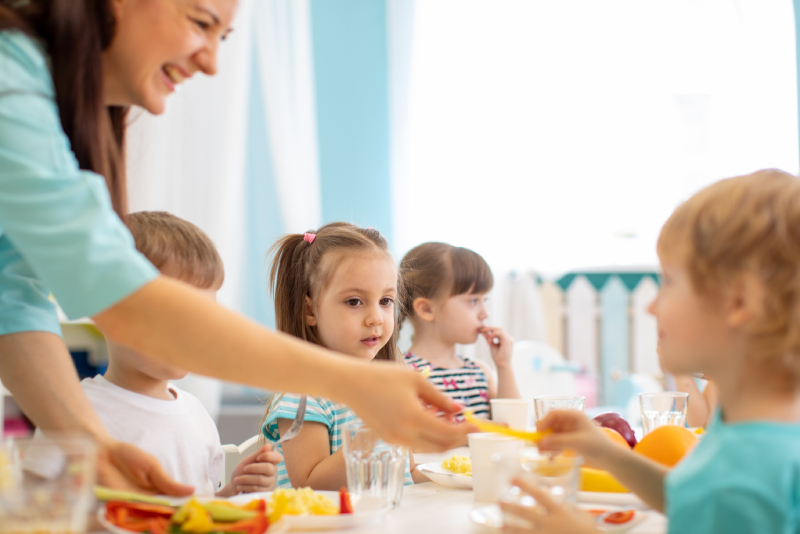Healthy Eating
Meals – Healthy Eating
As part of Healthy Early Years (HEY) we like to encourage healthy eating and drinking. All meals provided by the nursery consist of a varied and balanced diet to encourage healthy eating and parents who provide their child’s food are also supported in making healthy choices. Children learn to enjoy foods, and the reasons why some foods are healthy, and some are not, and we encourage them to make healthy food choices. We also teach children about food related hygiene, for example, washing their hands before eating.
In the Kitchen
All nursery meals are cooked and prepared daily by our award-winning specialised caterer who uses fresh ingredients and does not use salt, pepper, colouring, artificial flavourings, or additives.

Snacks and drinks
A variety of healthy snacks, such as fruit, crackers, and toast, are included in the daily fees. We also provide fresh milk and water throughout the day to ensure that the children are always well hydrated.
Mealtimes are ‘social times’
Meals are served `family style’ where the children are encouraged to socialise with their friends and carers. This helps encourage children to try new foods and make healthy food choices. We celebrate and value diversity with exciting menu’s which accommodate each individual child’s requirements (allergies, intolerances, religion and culture), by catering for special diets through consultation between parents and the child’s key person and our caterer. Younger babies are given milk and weaning foods provided by parents, at times who suit their individual needs.
It is essential that children are given the opportunity to celebrate special occasions and cultural events and food and drink is often used to mark these occasions. We will ensure that healthy options are provided.
Learning about and through food
It is a requirement under the Learning and Development requirements that we help children understand the importance of making healthy choices in relation to food. We do this through the seven areas of learning: Learning about food is an essential part of children’s development and is integrated into the seven areas of learning. The examples below show how learning about and through food can be linked to the Early Years Foundation Stage (EYFS).
Personal Social and Emotional development
Mealtimes offer children experiences to taste different foods, overcome dislikes and learn how to share. Sitting around a table eating food together is a good way to tech social skills. Cooking activities offer opportunities for learning through working alongside others and increasing self-esteem.
Physical development
Fine and gross motor skills can be developed through activities such as using knives and forks, preparing food and washing up. Mealtimes are able to be used to support children in making healthy food choices.
Communication and Language
Sitting around a table eating food together is a good way to teach conversation. Language is able to be developed and senses explored through discussing and describing the taste, texture, size, look and smell of food.
Literacy Many stories involve food. They can teach children about ingredients, where food comes from and about food for special occasions and from different cultures.
Mathematics
Activities such as counting out spoons and pieces of fruit when setting the table or at snack time can be used to support numeracy skills. Sorting and matching foods into different types is able to promote organisational skills and reasoning.
Understanding the World
Food tasting activities teach children about ingredients, the seasons and where food comes from including food different cultures. Growing fruit and vegetables teaches children about where food comes from, about life cycles, about gardening and how to look after plants. Many vegetables and herbs
are able to be grown on window sills and within pots or bags, which children are able to be involved in.
Expressive Arts
Art activities are able to engage children with food and alert them to colours and shapes.
